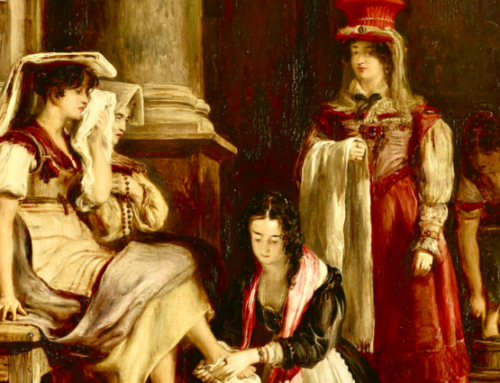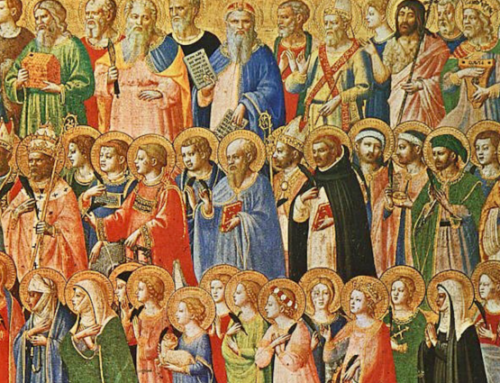Lent is an extended occasion for us to re-examine characteristic and mostly unconscious feelings of “entitlement,” that buzzword of our day…
Lent is once again upon us—and not a moment too soon. When Ash Wednesday comes, even mild fasting and abstinence wake us up and reveal all kinds of things we have taken for granted. I speak for myself, of course, but I don’t doubt that others share the same tendency toward semiconscious repetition and dulling habit and gradual neglect of the most essential things. When I was growing up as a Methodist in Middle Georgia, how could I have suspected that this injunction to self-discipline, this insistence that the body has real spiritual importance, would become one of the great attractions of my coming into the Church over 40 years ago?
In my skeptical teen years, I would have considered the very idea of religious asceticism sheer folly. Every time I reread Moby-Dick, which students at Wyoming Catholic College study in the first semester of senior year, I find myself amused by the alarm that Ishmael, the narrator of the novel, feels when his cannibal friend Queequeg goes into his “Ramadan,” as Ishmael metaphorically calls it. Queequeg locks himself in a room of the Spouter Inn and squats for an entire day, completely immobile, his little idol Yojo held on top of his head, until the sun comes up the next morning and he finally stands, stretching, completely genial. Ishmael works himself into a dither at what he considers the absurdity of this practice. He tries to reason with his friend, “beginning with the rise and progress of the primitive religions, and coming down to the various religions of the present time, during which time I labored to show Queequeg that all these Lents, Ramadans, and prolonged ham-squattings in cold, cheerless rooms were stark nonsense; bad for the health; useless for the soul; opposed, in short, to the obvious laws of Hygiene and common sense.”
What amuses me about Ishmael’s earnest imprecations is that they so closely resemble what I used to think. One of the chapters in William James’s book The Varieties of Religious Experience called “The Religion of Healthy-Mindedness” describes something like my former perspective, especially the emphasis on “the obvious laws of Hygiene and common sense.” Writing at the turn of the 20th century, James saw this kind of “healthy-mindedness” arising not just as an alternative to Christianity, but as an increasing force within it: “We have now whole congregations whose preachers, far from magnifying our consciousness of sin, seem devoted rather to making little of it. They ignore, or even deny, eternal punishment, and insist on the dignity rather than on the depravity of man.” As James puts it, these preachers “look at the continual preoccupation of the old-fashioned Christian with the salvation of his soul as something sickly and reprehensible rather than admirable; and a sanguine and ‘muscular’ attitude, which to our forefathers would have seemed purely heathen, has become in their eyes an ideal element of Christian character.”
Even if we don’t imagine Lent as “sickly and reprehensible,” it’s easy to get it wrong. Is it a time to dwell miserably on our sins, or is it rather a way to lose those extra pounds, re-concentrate our powers, and come out healthier than ever? I’m afraid those alternatives (or some combination of them) are the ones we sometimes thoughtlessly imagine. Suppose we take it, instead, as the occasion for a grateful encounter with Wisdom. As the first chapter of the Book of Sirach says, the Lord “has poured her forth upon all his works, upon every living thing according to his bounty; he has lavished her upon his friends.” One of the best perspectives I have heard on Lent came yesterday in an Ash Wednesday sermon by Fr. James Schumacher at Holy Rosary here in Lander. Prayer, fasting, and almsgiving, rather than ways of focusing on ourselves, are all means of “sharpening our gratitude” to God. The goods we enjoy come as gifts for the unworthy rather than wages for the deserving.
With respect to gratitude, Lent is an extended occasion for us to re-examine characteristic and mostly unconscious feelings of “entitlement,” that buzzword of our day. With respect to others, the word is often deployed to mean their belief that they are inherently worthy of privileges or special treatment. But what happens when we examine our own sense of deserving? Yesterday, Ash Wednesday revealed the presence of undue entitlement like one of those contrast dyes that doctors use in preparing their patients for x-rays or CAT scans—and none too soon.
The Imaginative Conservative applies the principle of appreciation to the discussion of culture and politics—we approach dialogue with magnanimity rather than with mere civility. Will you help us remain a refreshing oasis in the increasingly contentious arena of modern discourse? Please consider donating now.
Editor’s note: The featured image is “Christ in the Desert” (1872) by Ivan Kramskoi, courtesy of Wikipedia.








Leave A Comment